Report on Sophia University’s UN Weeks June, 2023
Roles of UN specialized agencies and Japan’s efforts
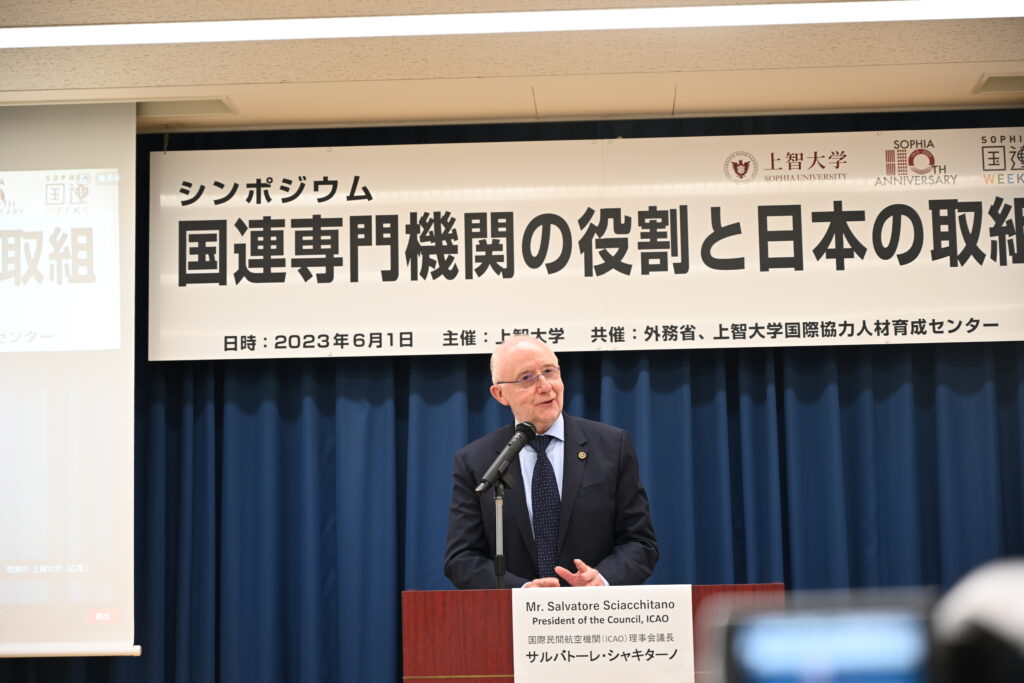
On June 1, a symposium was held to introduce the roles and activities of various UN specialized agencies and to consider Japan’s cooperation and efforts to address global issues. Prof. Yasuhiro Ueki, Director of Human Resources Center for International Cooperation, Graduate School of Global Studies, moderated the symposium.
Mr. Salvatore Sciacchitano, President of the Council, International Civil Aviation gave a special lecture on behalf of the International Civil Aviation Organization (ICAO), a specialized agency of the UN established under the International Civil Aviation Convention adopted in 1944. ICAO works to develop international civil aviation in a safe and orderly manner, to ensure that international air transport services are operated in a sound and economical manner based on equality of opportunity, to cooperate with member countries, to draft treaties, and to develop international standards, advisory schemes, and guidelines on safety and security. In addition, ICAO discusses and promotes measures to address environmental protection issues, including climate change, in the field of international aviation. Japan joined ICAO in 1953, and this year marks its 70th anniversary.
Mr. Sciacchitano introduced ICAO’s efforts in detail by presenting the organization’s five strategic goals: “Promoting Safety,” “Promoting Security,” “Improving Airway Efficiency,” “Economically Developing Air Transport,” and “Protecting the Environment.” After the lecture, he responded to questions from the participants in details.
Following the lecture, staff members from the Office of Specialized Agencies, International Cooperation Bureau, Ministry of Foreign Affairs of Japan gave a presentation and participated in a panel discussion. Mr. Shinji Matsui, Consul General of Japan in Auckland, who served as Director of the office until April, opened the session by urging the participants to ” think of global issues as your own and consider possible solutions to those issues. ” “Let us consider ways of solving those issues and learn from each other,” he added, introducing the 15 specialized agencies of the United Nations.
Next, Mr. Toru Inohara, in charge of ICAO and the International Maritime Organization (IMO), Ms. Yuri Okazaki, in charge of the International Labor Organization (ILO), Mr. Kimihiro Nakamura, in charge of the International Telecommunication Union (ITU) and the Universal Postal Union (UPU) as well as Ms. Akari Ito who is in charge of the World Tourism Organization (UNWTO), made presentations in turn. They gave an overview of the organizations they are in charge of, their activities, and the role of Japan. A panel discussion followed to provide answers to the questions received in advance as well as to those asked by the participants.
“Peace!” From NAGASAKI to the World -Message from Doctor Takashi Nagai, atomic-bomb survivor, and his wife Midori
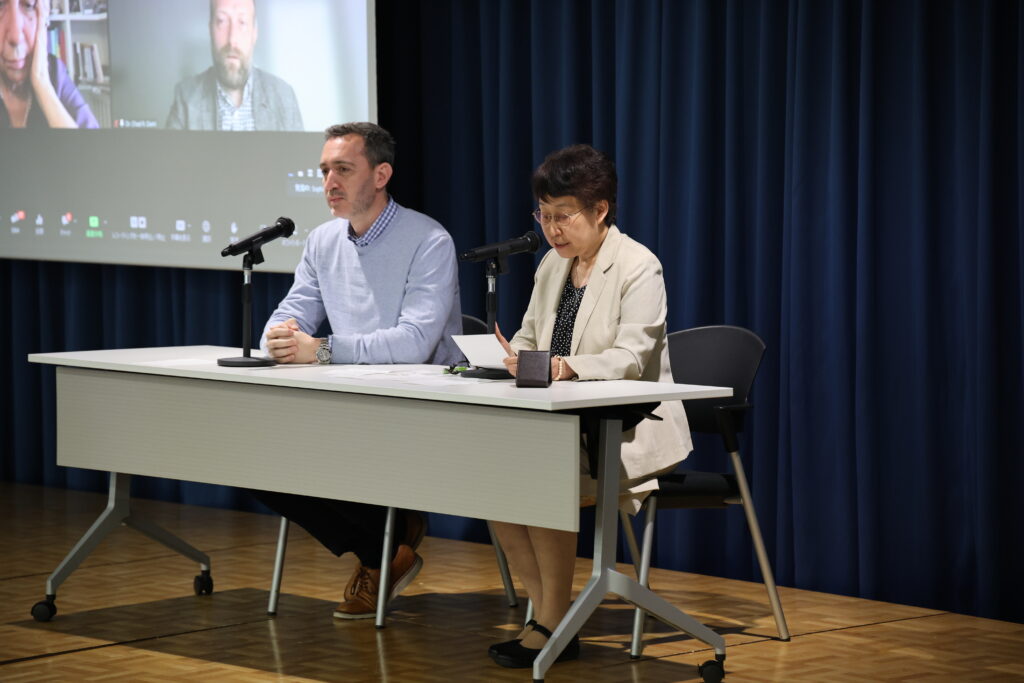
On June 3, a symposium was held to convey the message of Dr. Takashi Nagai who lost his wife in the atomic bombing, yet devoted himself to helping hibakusha, as well as the message entrusted by his wife Midori, in order to explore possibilities for building a world of peace with hope in this present era. Approximately 100 people attended the event, in addition nearly 300 people viewed the event online.
Prof. Haruhi Katayama of the Faculty of Theology, who organized the symposium, opened the session as moderator. Opening remarks were made by Chancellor Sali Augustine and His Excellency Monsignor Leo Boccardi of Apostolic Nuncios to Japan, who expressed his hopes for the symposium.
The first speaker was Ms. Paola Marenco, online from Italy. Ms. Marenco is a physician and vice president of the Italian “Medicina e Man” Association. He is also vice president of the “AMICI di TAKASHI e MIDORI,” established in Rome for the canonization of Mr. and Mrs. Nagai that is recognized by the Archdiocese of Nagasaki. Mr. Malenko introduced the life of Takashi Nagai, sharing numerous photographs.
Following Mr. Malenko, Mr. Gabriele di Comite, Medical Director of AstraZeneca Japan and Chairman of “AMICI di TAKASHI e MIDORI” shared various episodes of Mr. and Mrs. Nagai’s lives and stated that Takashi found the true meaning of life through his encounter with Midori.
The next speaker was Mr. Chad Diehl, an online speaker from the United States. Mr. Diehl is an Instructional Designer at the University of Virginia and a Japanese historian. Mr. Diehl introduced Takashi Nagai’s books, including “Leaving This Child Behind” and “The Bells of Nagasaki,” and described his efforts to rebuild Nagasaki through those works.
Finally, Professor Katayama gave a presentation from the perspective of a specialist in Christian literature. She quoted from Takashi Nagai’s books and introduced the background and thoughts behind his writings. She explained the true meaning of the word “providence” as described by Takashi and showed the similarities with Viktor Frankl’s “Night and Fog.” She concluded by expressing her hope to convey the couple’s message to the world through the activities of the “AMICI di TAKASHI e MIDORI,” and to work together to build world peace.
During the Q&A session that followed the four speakers’ presentations, the audience raised many questions and comments. After sharing thoughts for peace, the symposium was closed with a greeting by Fr. Sung-il Lee, Director of the Catholic Jesuit Center.
Is UN Reform Feasible?
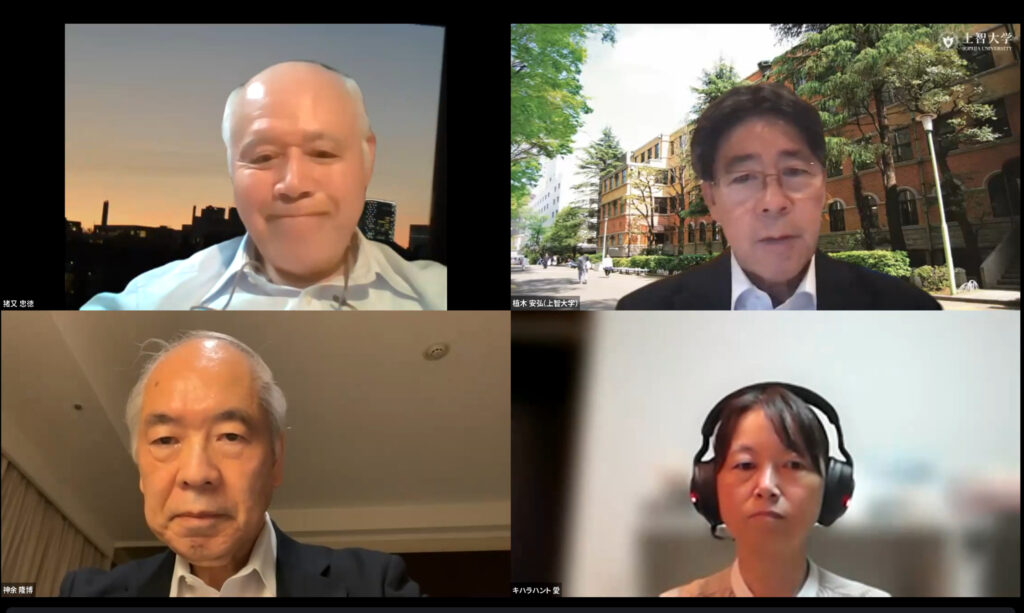
On June 5, an online symposium was held to discuss UN reform by three experts with various experiences at the UN. Prof. Yasuhiro Ueki, Professor of the Graduate School of Global Studies, moderated the session and began by explaining the purpose of the symposium and his views on UN reform.
The first speaker was Mr. Tadanori Inomata, Director of the UN Association of Japan, former Inspector of the Joint Inspection Unit of the UN System, and former Chair of the Executive Committee of the Multilateral Fund, Ozone Secretariat. He discussed UN reform under the title “An Attempt at International Public Administration Perspective.” He discussed issues relating to UN system resource management based on the need to establish a governance framework capable of preventing conflicts and disasters in the post-Corona period, and explained the conditions under which such a framework would function in the UN system.
Next, Prof. Takahiro Shinyo, Trustee of Kwansei Gakuin University, and Deen and Professor at the Integrated Center for UN and Foreign Affairs Studies, gave a presentation titled “Challenges of UN Reform Revealed after the G7 Summit,” first explaining the essence of UN reform. He then discussed various points, including practical reform of the Security Council as seen from the war in Ukraine, the outcome of the G7 Summit and the promotion of nuclear disarmament, the role of Secretary-General Guterres and the upgrade toward “UN 2.0,” and Japan’s role in this regard.
Finally, Prof. Ai Kihara-Hunt, Professor of the Graduate School of the University of Tokyo, and Director at Research Center for Sustainable Peace, gave a presentation titled “Is UN Reform Feasible: From the Perspective of Shared Values?” Touching on the current status and issues of how each country accommodates human rights, the supremacy of law, and the principle of non-use of force, she stated that it is critical for UN reform to reconfirm the values shared by each country considered universal, and to restructure the system that upholds those values.
Participants posed many questions on issues related to reform of the Security Council, such as the number of permanent seats for African countries on the Council, indicating the high level of interest toward reform of the United Nations.
SDGs Midpoint Assessment and Future Agenda
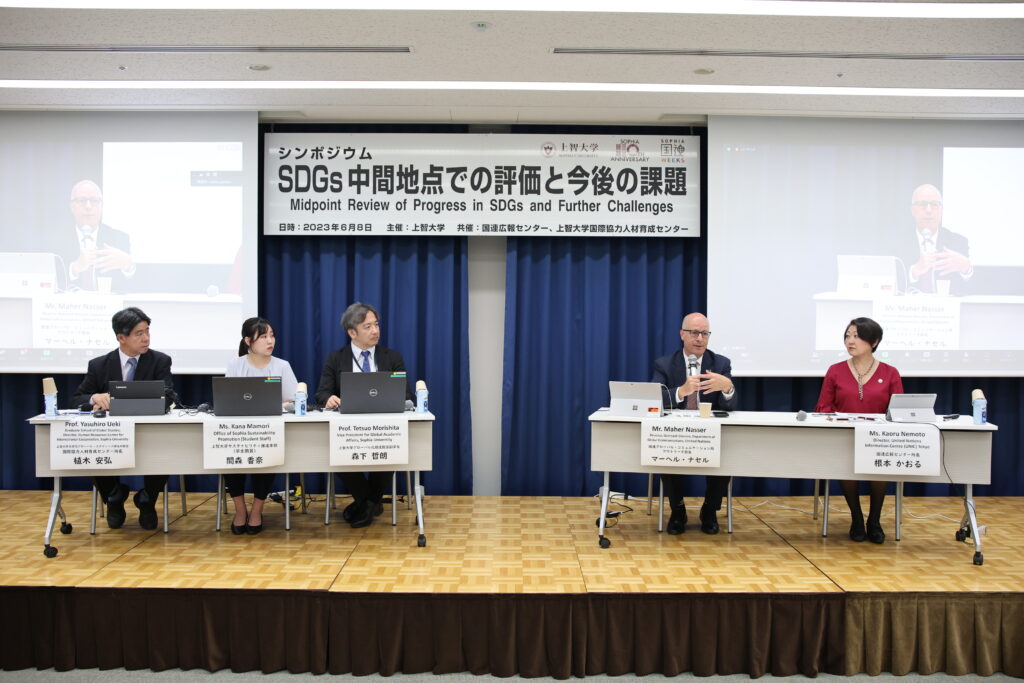
On June 8, a symposium moderated by Prof. Yasuhiro Ueki, Professor of the Graduate School of Global Studies, was held to provide a mid-term assessment of the SDGs to be achieved by 2030 and to discuss challenges going forward.
To begin, Mr. Nikhil Seth, Executive Director, United Nations Institute for Training and Research (UNITAR), Assistant to Secretary-General delivered online lecture. In his opening remarks, he touched on the crisis of multilateralism, pointing to the weakening of international cooperation and the increasing complexity of global issues such as poverty and disputes. Against this backdrop, he reported that only 12% of the SDGs are progressing on schedule. Citing specific action benchmarks, he emphasized the need to rethink the prioritization of building sustainable governance at the national level.
Mr. Maher Nasser, Director, Outreach Division, Department of Global Communication at the UN followed, and he noted that the cooperation of the general public is essential to achieving the goals. He urged the public to act from a critical perspective and not be fooled by “greenwashing” by the private sector or fake news from individuals or the media. He also mentioned the UN’s involvement with the Osaka Expo to be held in 2025.
Ms. Kaoru Nemoto, Director, United Nations Information Centre, explained the level of awareness and interest in the SDGs in Japan based on data. She told “While awareness of the SDGs is rising overall, teenagers have a particularly high level of awareness. Young people will play a leading role towards 2030.” In addition, she encouraged the participants to act on climate change issues that are threatening our lives.
Next, Prof. Tetsuo Morishita, Vice President for the Promotion of Globalization, and Ms. Kana Mamori (3rd year student, Faculty of Global Studies), a student employee at Sophia University’s Sustainability Promotion Division, took the stage. They introduced Sophia University’s SDGs and sustainability activities, including the establishment of this office in 2021 as a foundation for the university to further fulfill its social responsibility and to enhance sustainability of society based on the four universal aspirations (UAPs) of the Jesuits, the founding body of Sophia University, and the SDGs set forth by the United Nations.
The lecture was followed by active Q&A sessions among the participants and the symposium ended with everyone sharing the enthusiasm for achieving the SDGs.
Career Workshop for field in international cooperation and related fields
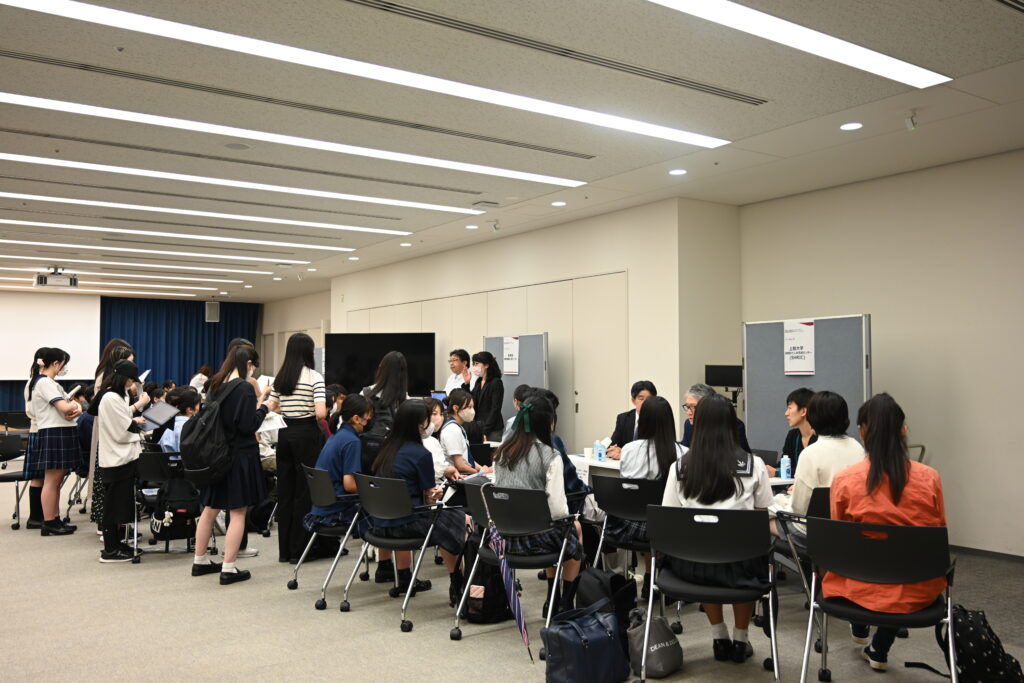
On June 12, a career workshop was held for those who are considering careers in international cooperation and related fields.
Prior to the workshop, Mr. Roberto Benes, a representative of the Tokyo Office of United Nations Children’s Fund (UNICEF), gave a keynote speech titled “Situation of Children worldwide, UNICEF’s work and Career Opportunities.” This talk was also streamed online to a large audience attended outside the venue. Mr. Benes introduced the work of UNICEF, which was established in 1946 to provide emergency relief to children affected by World War II. He encouraged those who wish to work in the field of international cooperation to “work together to protect the rights of children around the world and to facilitate their education and well-being.”
Prof. Yasuhiro Ueki of the Graduate School of Global Studies, who served as moderator, then introduced the participating organizations at the workshop. Mr. Hisashi Takanashi, former Chief Consultant, Engineering and Consulting Firm Association Japan/former Industrial Development Officer of the United Nations Industrial Development Organization; Ms. Eiko Narita, Chief of the United Nations Population Fund Office in Japan; Mr. Koichi Omori, Senior External Officer of the World Bank Tokyo Office; Ms. Masae Shimomura, Deputy Executive Officer and Government Relations Officer, WFP Japan; Mr. Tadahiko Yamaguchi, Director, and Ms. Michiko Nakano from Recruitment Center for International Organizations, United Nation Planning and Administration Division, Ministry of Foreign Affairs of Japan. And in addition to Professor Ueki, Mr. Yoshiteru Uramoto and Lecturer Eri Yamazaki from Human Resources Center for International Cooperation at Sophia University participated. This was the first time in four years that the event was held in person, and many students who aspire to work for international organizations or in the field of international cooperation gathered at the venue for an enthusiastic crosstalk session.
How Japan, the Organization of Islamic Cooperation (OIC), the Islamic Development Bank (IsDB), and the United Nations Can Work Together to Support Afghanistan
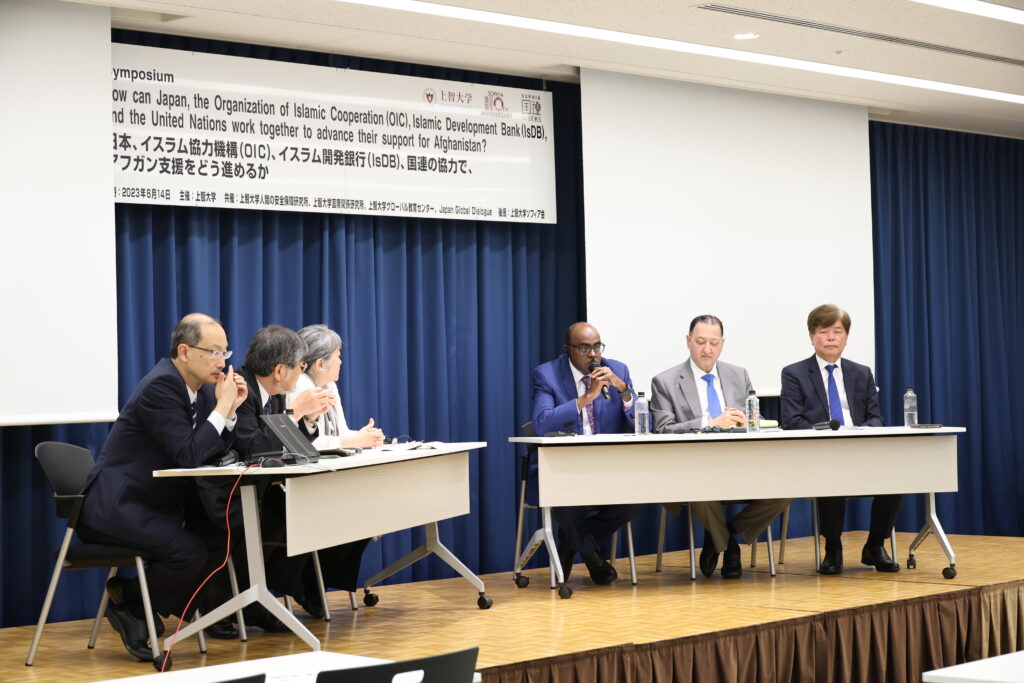
On June 14, Amb. Tarig Ali Bakheet, Special Envoy of the Organization of Islamic Cooperation (OIC) for Afghanistan, and Eng. Mohammad Al-Saati, Special Advisor for President of IsDB, were invited to participate in the international symposium. The event was moderated by Prof. Daisaku Higashi of the Center for Global Education, who directed the event, with nearly 300 participants attending in person and online.
The symposium kicked off with opening remarks made by President Yoshiaki Terumichi and Ken Aoki, Director of the Sophia Institute for Human Security, followed by an overview of the current situation in Afghanistan by Prof. Higashi, and a presentation by Special Envoy Bahit on the role of the OIC in Afghanistan and Japan’s relationship with the country.
Mr. Masaru Murakami, chairman, and Ms. Yuko Sawada of the Peshawar Association, then spoke about the late Dr. Tetsu Nakamura’s 40 years of activities in Afghanistan, especially irrigation projects through canal construction which is still expanding and 24,000 hectares of land that was deserted due to drought is now being restored as farmland.
Mr. Al-Sati also introduced the work of the Islamic Development Bank and the Afghan Humanitarian Trust Fund. Prof. Higashi mentioned that the bipartisan Diet Members for Population Issues established the Afghanistan Project Team in August 2022, and that a framework for supporting Afghanistan is being established, including Diet members, and that this time the University held a three-day workshop with officials from OIC and IsDB, aiming to enhance cooperation between OIC and IsDB with Japanese NGOs, JICA, the Ministry of Foreign Affairs, and others.
This was followed by comments from Prof. Tetsuo Kondo, former UN Development Programme Representative in Japan and current Distinguished Professor at Kyoto University, and Mr. Masao Torii, President of Sophia Alumni Association. In response to these comments, Prof. Sali Augustine, Chancellor of Sophia University, raised the question of what obstacles stand in the way of cooperation in helping Afghanistan, and the first half of the symposium was concluded.
In the second half of the symposium, a panel discussion was held with all the speakers responding to questions from the participants. Questions raised ranged from “What are the challenges of deploying large-scale humanitarian aid?” to “What are the pros and cons of providing aid to other countries while the number of impoverished people in Japan is increasing?”
In closing, Chancellor Augustine emphasized the significance of the discussion on the issue of humanitarian assistance, which embodies our university’s educational spirit of “For Others, With Others,” on this occasion of its 110th anniversary. He expressed his hope that this invitation project, which embodies the university’s founding philosophy of Sophia-Bringing the World Together, will promote further cooperation with the Japanese government, international organizations, NGOs, educational institutions, individuals, and others. He concluded this symposium by noting, “I am convinced that the interest and determination of each and every individual participating in this project can change the world, step by step, for the better.”
Youth Proposals for Future Peace in Northeast Asia
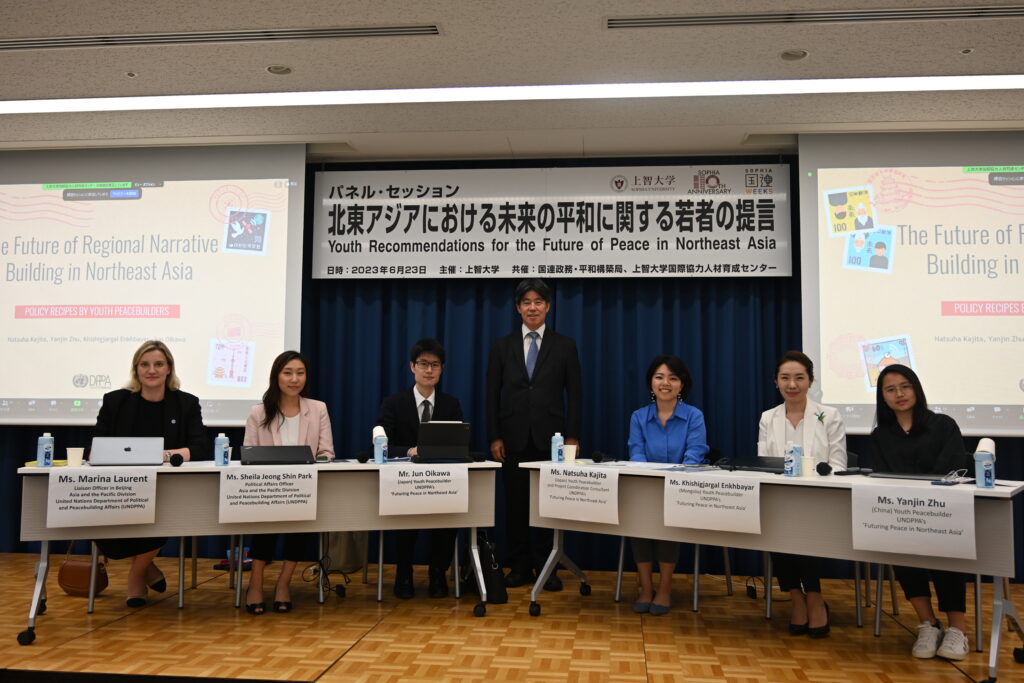
On June 23, a panel session was held to discuss how youth can contribute to peace and security in Northeast Asia. Ms. Sheila Jeong Shin Park, Political Affairs Officer from the United Nations Department of Political and Peacebuilding Affairs (UNDPPA), and Ms. Marina Laurent, Liaison Officer, were invited to participate in the discussion.
Prof. Yasuhiro Ueki, Graduate School of Global Studies, moderated the session, explaining the UN’s series of activities focusing on youth.
He was followed by panelists representing Japan, China, and Mongolia, who are active as Youth Peacebuilders in making proposals and developing human resources for peacebuilding. They introduced the results of the UNDPPA project “Future Peace in Northeast Asia,” in which they participated, as well as their past activities.
During the Q&A session that followed, many questions were posed by audience members and online participants. The panelists thoughtfully responded to questions such as ” How can high school students contribute to building world peace?” and “How the speakers got started in this kind of activities?” and so on.
In closing, Ms. Laurent noted, “There are many barriers to promoting peacebuilding activities in Northeast Asia, but the upside is that this is our chance for resolving those issues. We must continue to engage in exchange and dialogue through the invaluable bonds created by such opportunities in order to realize peace in the future,” concluding the event on a high note.
“Learning Community” for a Sustainable Future
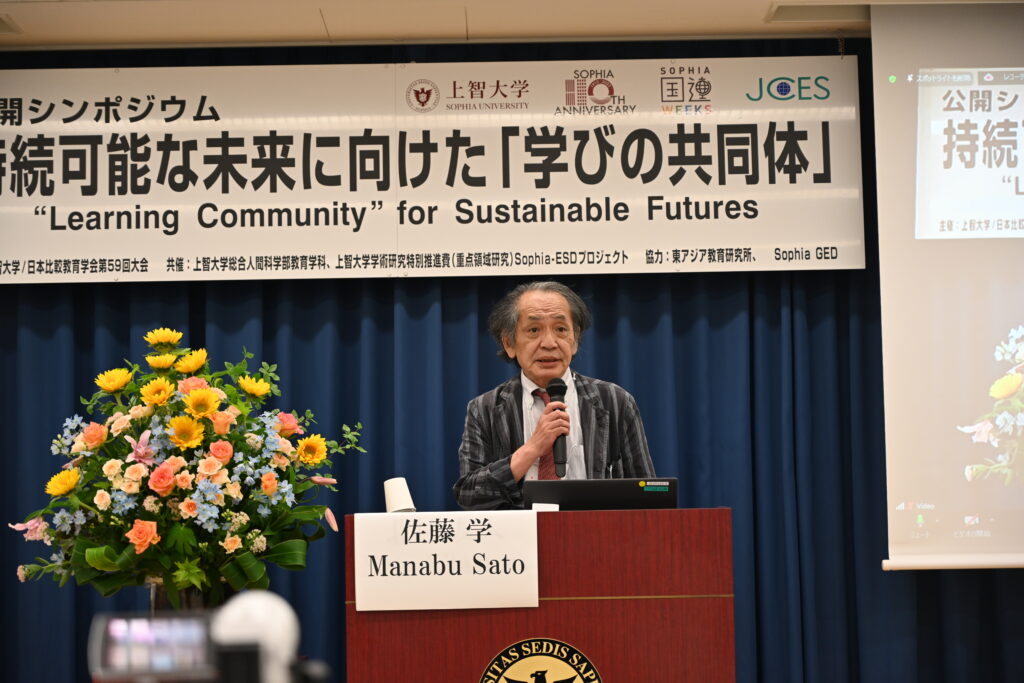
On June 24, a symposium was held to discuss the meaning of learning and the collaboration of people supporting such learning, while examining the field of education in Japan and around the world, as we are faced with a series of challenges toward a sustainable future. The symposium, which also served as a conference of the Japan Comparative Education Society, was attended by about 250 people, fully occupying the venue. Over 220 people participated from the online community as well. Assistant Professor Dr. Takayo Ogisu of the Faculty of Global Studies moderated the symposium, and Professor Miki Sugimura, Faculty of Human Sciences.
Professor Emeritus Manabu Sato of the University of Tokyo gave keynote speeches. Prof. Sato spoke of the three years that had passed since the outbreak of Corona, claiming that “children’s right to learn had been taken away and their ability to learn had been constrained.” He then described the current state of the learning community, introducing trends and challenges in global education reform: “The crisis of global capitalism has been accelerated by the Corona, the 4th industrial revolution, wars, and the destruction of the global environment. The threat to the welfare of our children’s future is growing. The reality is desperate, but we want to explore the potential of the future in a learning community that strives for sustainability.”
The four panelists then took the stage in turn. Prof. Yuto Kitamura of the Graduate School of Education at the University of Tokyo spoke on “International Cooperation in Education and Knowledge Diplomacy”; Prof. Masamichi Ueno of the Department of Education, Faculty of Human Sciences at Sophia University on “Learning in East Asia and the Development of School Reform”; followed by Prof. Yukiko Sawano of the Department of Education, Faculty of Liberal Arts, University of the Sacred Heart spoke on “Post-Socialist Education in Former Soviet Union Countries”; and Prof. Hideki Maruyama of Faculty of Global Studies on “Sustainable Future”, commenting on each topic from their respective perspectives.
Finally, Prof. Sato and all four panelists took the stage for discussion in which they responded to questions from the audience both in person and online. Lively discussions ensued. Prof. Sato emphasized “There is much to learn from reality, and the work of education is a set with learning,” concluding the session.